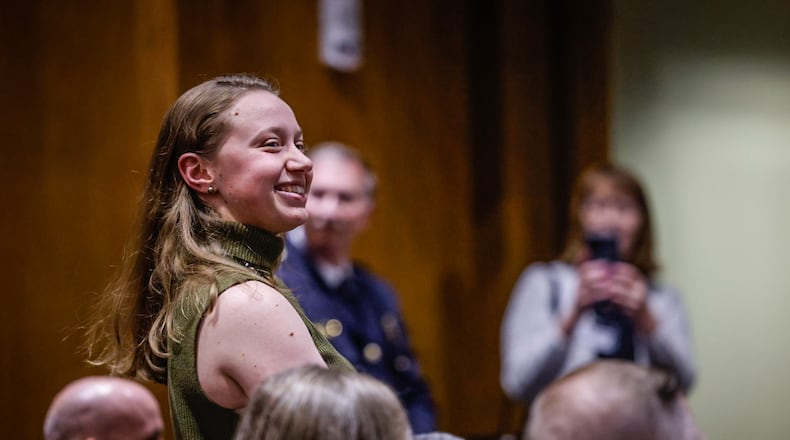My greatest fear in writing Behind the Badge is that this body of work will be taken and twisted into weapons of the most impure kind I can imagine, that being American politics.
And if you think I’m only talking about the other side of the aisle from wherever you’re sitting, you’ve already missed my point.
It’s no secret that police are at the center of cultural and political debate in this country. That’s the main reason we did this project: Police officers wield profound power, and thus deserve clear-eyed scrutiny. They are also men and women serving an indispensable role and shouldering immense responsibility.
Throughout the Behind the Badge project, we have investigated how police are trained, analyzed use of force trends, written about how police and society handle people with mental illness, and much more.
I also trained alongside the cadets, waking up early for physical training and even taking a shot of pepper spray to the face. And yes, I passed the qualifying mile-and-a-half time, and met the minimum pushups and sit-ups qualifications for my age group.
Here’s the thing. If you step away from the online rage farms, touch grass, and get curious about other human beings, you’ll find that most people really want to do a few things. One is to help others. They want to do well in their jobs and in their lives. And they’re also willing to see others as human beings.
The great challenge in police work is not learning how to do the individual tasks. It’s not learning the basics of RADAR and LIDAR or learning how to do a field sobriety test. This is not to say that those things aren’t difficult, and don’t require hard work and study to master.
However, the foundation for all of it, the lynchpin of that training, is the mastery of the mind.
It’s training the mind not only to retain its logical faculties under pressure, but its empathetic faculties as well. It is entering a situation where people are emotionally charged and potentially wielding firearms, and being the most calm and collected person in the room. It is repeatedly raising your heart rate to the point that critical thinking becomes difficult, and honing the mind into critical thinking and compassion anyway.
It is befriending anxiety, without allowing it to touch the steering wheel.
In the same vein, one of the biggest things that surprised me was the emphasis that modern policing has put on the mental health of its officers. In many ways, the police officer is considered the quintessential “tough guy:” running towards the danger, encountering and managing the absolute depths of human depravity, and waking up the next day and doing it all over again.
The message for cadets to take care of themselves, both physically and mentally, to establish a support system and talk to a mental health professional when needed, comes from the top.
Some say that the new generation who cares more about mental health is “weaker” for not being able to handle this reality day in and day out. The truth is that no one can handle that kind of stress, and perhaps more importantly, no one should.
The cliché with people who do these kinds of things is that it’s a lot harder than it looks. And don’t get me wrong, it is. Officers have to make split second decisions, often with limited information, and the adrenaline factor alone can make that infinitely more complicated.
But one of the biggest things I’ve learned these last months, in both training alongside the 19 cadets and in writing about them, is that excellence is achievable.
Their stories are inspiring, from Fidele Ngabo who escaped genocide in Rwanda and now wants to serve the community, to Austen Brown who is following in his father’s footsteps, to Catie Wise, who not only put herself through the police academy, but worked 40 hours a week as a dispatcher while doing it.
Credit: JIM NOELKER
Credit: JIM NOELKER
In my experience, there are some life projects where the path to improvement is totally opaque. However, over the course of the police academy, I could see a path to improving my mental fortitude, and ability to handle high-stress situations. It felt achievable.
Human beings can and have accomplished incredible things. Like any other job, there are days that suck, and the paperwork is tedious.
Parts of the academy, from my perspective, sucked for the cadets. There were multiple points where cadets were in the classroom seven days a week, back to back, copying notes, studying for tests, memorizing scripts and interview techniques, and so on. This is after getting up and running, training for an hour every other morning, plus more physical conditioning on their own. It’s difficult.
Throughout this process, I gained a deeper appreciation for police work, and more importantly, the people who do that work. I hope the same is true of the cadets who have worked with me.
But more than anything else, I hope my work has been meaningful in helping readers better understand law enforcement, and allowing informed debate over how we give cadets the training and resources they need to serve our community.
Credit: Marshall Gorby
Credit: Marshall Gorby
About the Author



